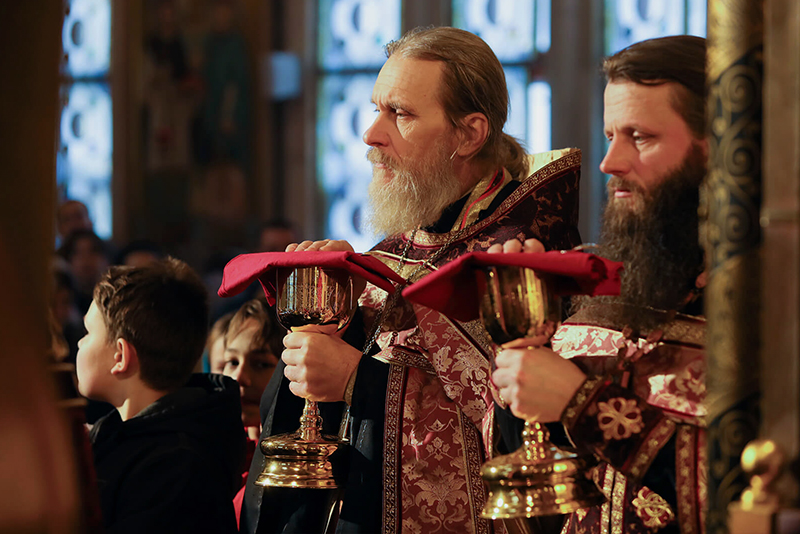
The long-term practice of obligatory confession established in our church, besides the obvious advantages, has led many people to view confession not as an independent Sacrament, but as a stage of preparation for communion. On the one hand, confession before Communion is certainly a necessity in today’s world. On the other hand, we should remember that the existence of the sacrament of reconciliation does not mean that we can come to the Holy Chalice only after we have confessed as many sins as possible. Confession is inseparable from the daily scrupulous work that God expects each of us to be carrying out in our own souls. This work includes struggling with passions, resisting temptations and eradicating sin in any form. Confession gives Christians grace-filled strength to continue this work and crowns all our efforts in the field of repentance with the forgiveness of sins. The latter directly depends on our way of life and the firmness of our intention to correct it. If we do not make that effort and continue committing the same sins, our confession will have zero benefit, even if we confess daily.
The desire to free oneself from sins as much as possible in confession detached from the desire to renounce them in life, is what Protopresbyter Alexander Schmemann once aptly called “the introspection of a spotless mind” and has nothing to do with repentance. However, it is precisely this passion for mental cleanliness that is inherent in many modern Christians. It results in a strange and even absurd picture that I observe time after time, when after coming to confession on the night before the Communion, parishioners then confess again, already during the Liturgy. However, that may still not be enough for some, and they confess for the third time just before Communion. From the communication between the priests I know that these are not isolated cases, but a common practice in many parishes. No priestly admonitions have any effect on its adherents. They are so fond of their idea of coming to the Chalice as “purified” as possible that they would rather confess to different priests each time and migrate from parish to parish than change their strange habit, which their children also inherit.
This is sad, especially in view of the fact that no one needs this moment of “purity” before the Chalice. The known tradition of preparation for communion, which includes fasting, prayer rule and confession, is aimed at achieving a sincere penitential feeling, a broken heart and a humble consciousness of one’s unworthiness. Can these feelings be achieved by going to confession multiple times until we cannot think of any more sins? Alas, it is rather a deceptive feeling of “cleanliness” and a sense of contentment that we acquire. We come to a state of mind when we acknowledge that we have fasted, read all the necessary prayers and confessed everything that we remembered. We become pleased with ourselves and feel every right to count on “the remission of sins and … eternal life.” Any Gospel parallels come to mind yet? What about “I fast twice a week, I give a tenth part of all that I get” (Luke 18:12)?
An unconfessed sin that suddenly comes to mind can help a person gain the self-awareness of an unworthy sinner, sincerely sigh to God for mercy and come to the Lord’s meal in due humility. But in pursuit of “cleanliness” a person tends to associate this loss of confidence with disappointment, not penitence. He would probably still come to the Chalice, but then he would spend the whole day in useless attempts relying on purely carnal and sensual feelings to determine whether or not he has received communion properly.
In order not to bring ourselves to such a state, we must remember the following:
– we never are and can never be worthy of receiving the Body and Blood of Christ;
– it is not the preparation that “makes the unworthy worthy”, but Christ Himself, seeing the sincerity of heartfelt contrition and the depth of humility;
– all preparation for Communion serves, in fact, only one goal: the acquisition of that very contrite and humble state of mind;
– it is necessary to cleanse the soul from sins not particularly before the sacrament, but throughout the entire life, and not by confessing several times during one service, but constantly working on ourselves and confessing our failures with a firm intention to get up and continue the struggle;
– it is necessary to come to confession once before Communion, seriously and thoughtfully, with thorough preparation on the day before;
– the practice of repeated confession both on the eve and on the day of Communion should be recognized as vicious, serving not to cleanse the soul from sin, but to relaxation, neglect and profanation of the sacrament of reconciliation.
And, finally, if you suddenly remember an unconfessed sin, sincerely sigh to God for forgiveness and mercy and proceed with humility to Communion. Be sure that the sin that you have remembered is not the only one and that you will hardly ever confess all sins. However, none of our sins hinder the mercy of God if we sincerely repent of them. Besides, there is no reason why you shouldn’t omit this sin in future and “bring” it to your next confession.
Translated by The Catalogue of Good Deeds
Source: https://pravlife.org/ru/content/chto-delat-esli-posle-ispovedi-uzhe-pered-chashey-vspomnili-neispovedannyy-greh




